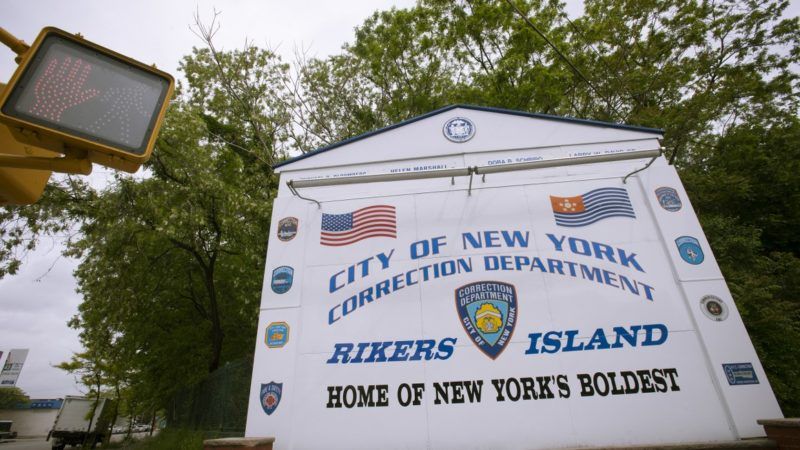The Prison Coronavirus Disaster Everybody Warned About Is Unfolding in New York City
Jail officials urge more and faster releases as the virus spreads between staff and inmates.

New York City is becoming America's coronavirus hot spot, with thousands of new cases being diagnosed every day. The number of infections in the Big Apple passed 10,000 over the weekend. By Saturday, 60 infected people in New York City had died. By Sunday morning, that number jumped to 114.
New York was always likely to be a hub of infection, given the size and density of the population. For those same reasons, the city's jails were bound to be prime locations to spread the coronavirus. As criminal justice advocates beg the city to keep people out of Rikers Island and other jails, we're now seeing the consequences.
On Saturday, Jaqueline Sherman, interim chair of New York City's Board of Correction, sent a letter to top criminal justice officials (including the district attorneys of all five boroughs) warning that coronavirus infections were spreading at Rikers and other jails. It says that over the course of the last week, 21 prisoners, 12 Department of Corrections employees, and five health officials serving New York City's jails have tested positive for the coronavirus. Another 58 people were being quarantined and monitored for possible symptoms.
The city has identified 40 people for release, pending approval from the district attorneys offices. Sherman bluntly tells them, "This number is far from sufficient to protect against the rapid spread of coronavirus in the jails."
Sherman also reminds these people that Rikers Island is not just a prison for hardened criminals who have been convicted of serious and violent crimes, even if that's how people see the place. It's where thousands of people go when they can't make bail. (Even though New York has reformed its cash bail system so that it's not required for most misdemeanors, judges are still authorized to set money demands for a host of more serious crimes.) It's also where parole violators are sent. Sherman notes that more than 600 prisoners in New York's jail system are being held for technical parole violations. That means they didn't violate the law but broke court-mandated rules of behavior, like violating curfew or missing a meeting with a parole officer. Some of them are back in jail for failing a drug test. Another 551 people in city jails are serving prison terms of less than a year. Sherman is urging the city to follow in the footsteps of Ohio and California and try to find ways to reduce the city's jail population.
Meanwhile, the New York Police Department (NYPD) doesn't seem to see the need to scale back its policing of low-level crimes. At a press conference on Friday, Commissioner Dermot Shea said he no intention of ending "broken windows policing," the practice of arresting people for low-level "quality of life" crimes.
But as of Sunday, the NYPD has reported 98 confirmed cases of the coronavirus among its own staff, both police and civilian employees. The spread of the coronavirus is bouncing back and forth between law enforcement and the people they're arresting and imprisoning. This is going to lead to deaths on both sides of the thin blue line. The first person connected to New York City's jail system to die of the coronavirus was not an inmate—it was a jail investigator from the Department of Correction who worked in an office three miles from Rikers.
The New York Post has kept up its crime fearmongering with this lovely misleading headline: "Man robbed at gunpoint after coronavirus-related release from Rikers." One might assume this headline to mean that one of the people released from Rikers because of the coronavirus had gone on to rob somebody. In fact, it's the opposite: The man who had been released from jail was robbed. If that weren't enough, the reporters start the story by declaring, "He was safer at Rikers." No. No, he wasn't.



Show Comments (36)